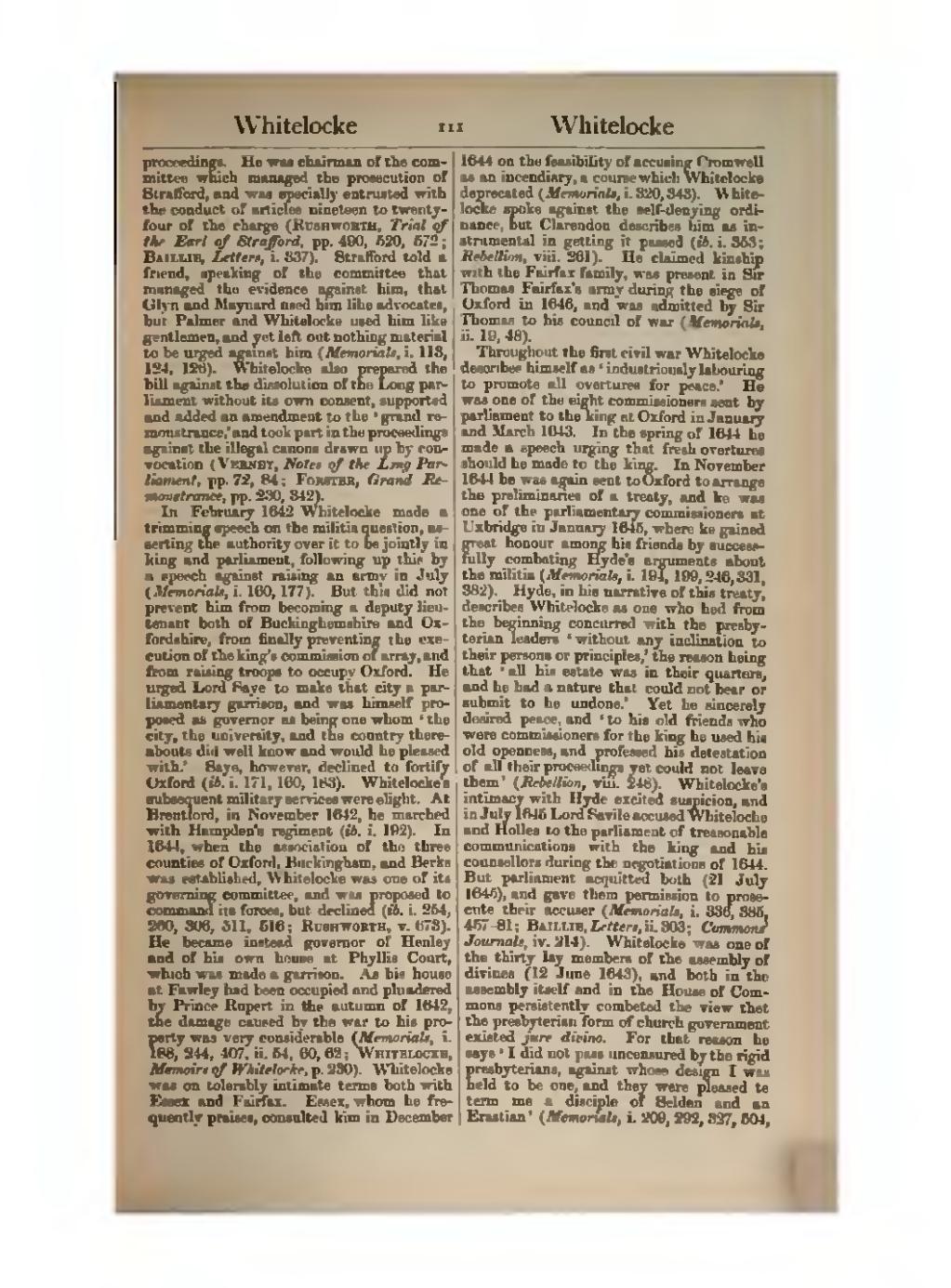proceedings. He was chairman of the committee which managed the prosecution of Strafford, and was specially entrusted with the conduct of articles nineteen to twenty-four of the charge (Rushworth, Trial of the Earl of Strafford, pp. 490, 520, 572; Baillie, Letters, i. 337). Strafford told a friend, speaking of the committee that managed the evidence against him, that Glyn and Maynard used him like advocates, but Palmer and Whitelocke used him like gentlemen, and yet left out nothing material to be urged against him (Memorials, i. 113, 124, 126). Whitelocke also prepared the bill against the dissolution of the Long parliament without its own consent, supported and added an amendment to the ‘grand remonstrance,’ and took part in the proceedings against the illegal canons drawn up by convocation (Verney, Notes of the Long Parliament, pp. 72, 84; Forster, Grand Remonstrance, pp. 230, 342).
In February 1642 Whitelocke made a trimming speech on the militia question, asserting the authority over it to be jointly in king and parliament, following up this by a speech against raising an army in July (Memorials, i. 160, 177). But this did not prevent him from becoming a deputy lieutenant both of Buckinghamshire and Oxfordshire, from finally preventing the execution of the king's commission of array, and from raising troops to occupy Oxford. He urged Lord Saye to make that city a parliamentary garrison, and was himself proposed as governor as being one whom ‘the city, the university, and the country thereabouts did well know and would be pleased with.’ Saye, however, declined to fortify Oxford (ib. i. 171, 180, 183). Whitelocke's subsequent military services were slight. At Brentford, in November 1642, he marched with Hampden's regiment (ib. i. 192). In 1644, when the association of the three counties of Oxford, Buckingham, and Berks was established, Whitelocke was one of its governing committee, and was proposed to command its forces, but declined (ib. i. 254, 260, 306, 511, 516; Rushworth, v. 673). He became instead governor of Henley and of his own house at Phyllis Court, which was made a garrison. As his house at Fawley had been occupied and plundered by Prince Rupert in the autumn of 1642, the damage caused by the war to his property was very considerable (Memorials, i. 188, 244, 407, ii. 54, 60, 62; Whitelocke, Memoirs of Whitelocke, p. 230). Whitelocke was on tolerably intimate terms both with Essex and Fairfax. Essex, whom he frequently praises, consulted him in December 1644 on the feasibility of accusing Cromwell as an incendiary, a course which Whitelocke deprecated (Memorials, i. 320, 343). Whitelocke spoke against the self-denying ordinance, but Clarendon describes him as instrumental in getting it passed (ib. i. 353; Rebellion, viii. 261). He claimed kinship with the Fairfax family, was present in Sir Thomas Fairfax's army during the siege of Oxford in 1646, and was admitted by Sir Thomas to his council of war (Memorials, ii. 19, 48).
Throughout the first civil war Whitelocke describes himself as ‘industriously labouring to promote all overtures for peace.’ He was one of the eight commissioners sent by parliament to the king at Oxford in January and March 1643. In the spring of 1644 he made a speech urging that fresh overtures should be made to the king. In November 1644 he was again sent to Oxford to arrange the preliminaries of a treaty, and he was one of the parliamentary commissioners at Uxbridge in January 1645, where he gained great honour among his friends by successfully combating Hyde's arguments about the militia (Memorials, i. 194, 199, 246, 331, 382). Hyde, in his narrative of this treaty, describes Whitelocke as one who had from the beginning concurred with the presbyterian leaders ‘without any inclination to their persons or principles,’ the reason being that ‘all his estate was in their quarters, and he had a nature that could not bear or submit to be undone.’ Yet he sincerely desired peace, and ‘to his old friends who were commissioners for the king he used his old openness, and professed his detestation of all their proceedings yet could not leave them’ (Rebellion, viii. 248). Whitelocke's intimacy with Hyde excited suspicion, and in July 1645 Lord Savile accused Whitelocke and Holles to the parliament of treasonable communications with the king and his counsellors during the negotiations of 1644. But parliament acquitted both (21 July 1645), and gave them permission to prosecute their accuser (Memorials, i. 336, 385, 457–81; Baillie, Letters, ii. 303; Commons' Journals, iv. 214). Whitelocke was one of the thirty lay members of the assembly of divines (12 June 1643), and both in the assembly itself and in the House of Commons persistently combated the view that the presbyterian form of church government existed jure divino. For that reason he says ‘I did not pass uncensured by the rigid presbyterians, against whose design I was held to be one, and they were pleased to term me a disciple of Selden and an Erastian’ (Memorials, i. 209, 292, 327, 504,
